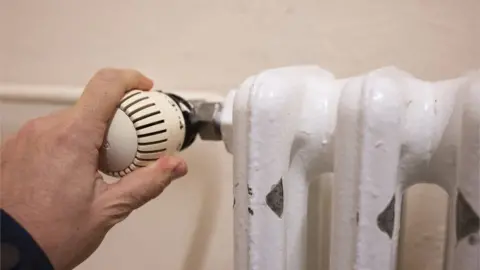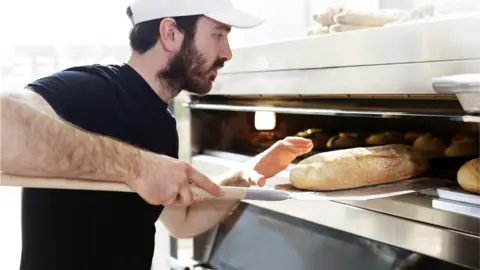Cost of living: What help is available in Northern Ireland?
 Getty Images
Getty ImagesAs energy prices hit unprecedented levels, the government has announced details of how it intends to help households and businesses in Northern Ireland deal with the cost of living crisis.
Recently announced interventions - such as help with home heating oil payments revealed on Wednesday - come on top of a number of different schemes announced previously.
Details about some of the schemes remain unclear for people in Northern Ireland due to the lack of a functioning executive.
What support will households get with energy costs?
As in the rest of the UK, there will be a cap placed on the unit price of electricity and gas for two years.
The cap will not come into place in Northern Ireland until November, one month later than in the rest of the UK.
The government said households in NI would see the same benefits with the support being backdated.
Households using home heating oil will receive a one-off payment of £100 to help with rising energy costs, the UK government announced on Wednesday.
This will be delivered as a top-up to the £400 Energy Bills Support payment which is going to all UK households.
Some politicians have criticised the £100 heating oil payment, with SDLP leader Colum Eastwood describing it as an "insult".
After weeks of discussion about how the £400 rebate would be delivered in Northern Ireland, which has a separate energy market to Great Britain, former Chancellor Nadhim Zahawi announced in August that the money would be paid directly to electricity companies, with the money then delivered through discounts on customers' bills.
Households in Great Britain will start receiving their discounts in October but it remains unclear when Northern Ireland residents will receive it.
The Northern Ireland Economy Minister Gordon Lyons says he expects the money will be paid out before Christmas.
What support is available to low-income households?
Two payments totalling £650 are being made to more than eight million low-income households across the UK which receive the following benefits:
- Universal Credit
- Income-based Jobseekers Allowance
- Income-related Employment and Support Allowance
- Income Support
- Working tax credit
- Child tax credit
- Pension credit
The first instalment of £326 was paid to about seven million people between 20 and 30 July.
The payments were made automatically into bank accounts - usually marked "DWP Cost of Living".
The 1.1m people who only receive tax credits, rather than any of the other benefits, had to wait longer.
Their first payment was also automatic, and was paid straight into bank accounts by HM Revenue and Customs (HMRC) between 2 and 7 September.
All eight million will receive their second instalment of £324 later in the year. The first group will receive the money in the autumn, and the smaller group of 1.1m in the winter. No exact dates have yet been confirmed.
What about people with disabilities?
Up to six million people across the UK on the following disability benefits started to receive £150 on 20 September:
- Disability Living Allowance
- Personal Independence Payment
- Attendance Allowance
- Scottish Disability Payments
- Armed Forces Independence Payment
- Constant Attendance Allowance
- War Pension Mobility Supplement
Some people will receive this help on top of an earlier £650 payment.
None of these cost-of-living payments affect the tax some pays or the benefits or tax credits they receive.
Support for pensioners
If you were born on or before 25 September 1956 you could get between £250 and £600 to help you pay your heating bills this winter.
People usually get this automatically if they are eligible and get state pension or another social security benefit and do not normally need to make a claim.
Most payments are made automatically in November or December. Recipients should be paid by 13 January 2023.
 Getty Images
Getty ImagesWhat help will businesses receive?
On Wednesday the government announced a unit price cap for electricity and gas for businesses, similar to the one in the rest of the UK.
Wholesale energy prices for businesses will be capped at "less than half" anticipated winter levels under a huge government support package
The Energy Bill Relief Scheme will offer discounts for all firms in Great Britain for six months from 1 October.
Hospitals, schools and other settings such as community halls and churches will also get help.
Northern Ireland is in a different energy market from the rest of the UK, so Northern Ireland businesses will get a scheme based on the same criteria and offering comparable support, but "recognising the different market fundamentals".
Retail NI has said it is "hugely disappointing" that more clarity has not been provided on the energy cap.
Colin Neill, chief executive of Hospitality Ulster, said it was "simply unacceptable" that businesses in Northern Ireland do not yet have the full details of how support will be provided.
The BBC understands that it is the government's intention to provide details by the end of the September.
